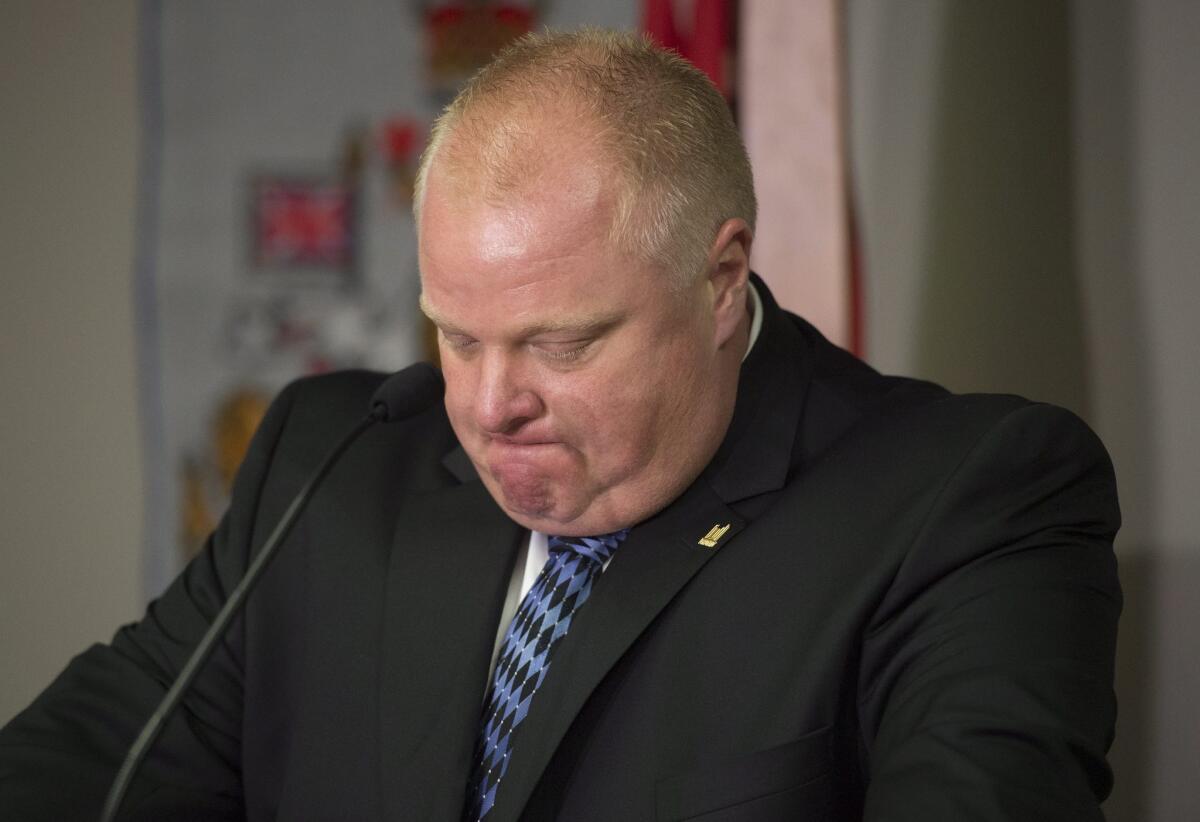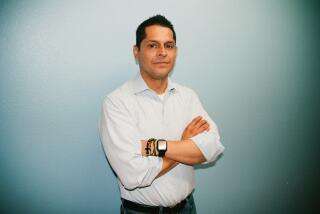Rob Ford quits Toronto mayor’s race but plans to run for City Council

Through scandal, humiliation and public outrage, Toronto Mayor Rob Ford has never eased up on his belligerent counteroffensive.
He denied for months last year that a video reportedly showing him smoking crack cocaine could exist, until police recovered it in a raid in November and he was forced to concede that it must have happened “during one of my drunken stupors.”
The portly, profanity-spewing mayor of Canada’s biggest city didn’t even attempt to dispute the authenticity of another video that surfaced a few weeks later showing him ranting and wildly gesticulating as he threatened to kill someone.
Transcripts of wiretapped phone calls released by authorities last year suggest that Ford also used heroin in the company of suspected drug dealers, and Canadian news media have alleged that he and his supporters were involved in kidnapping one of the dealers who was attempting to blackmail him over the tape.
Ford, 45, refused to resign as mayor at the peak of his political crisis and has stubbornly persisted in going to work each day — except for a two-month break for rehab — since being stripped by the City Council of all significant authority 10 months ago.
Even the possibility that he may have a fight against cancer ahead hasn’t driven Ford entirely into political exile.
He withdrew his candidacy Friday from the Oct. 27 mayoral race, but he simultaneously disclosed that he has thrown his hat in for the City Council seat occupied by older brother Doug Ford, who now intends to run for mayor.
Rob Ford had been polling in second place for the mayor’s office but had pulled up by a couple of percentage points in the most recent voter surveys, allowing him to overtake former city councilwoman and New Democratic Party candidate Olivia Chow since he returned from substance-abuse counseling. He still trails businessman and fellow conservative John Tory, who was among the candidates Ford defeated four years ago.
“Ford is down, but nobody who has watched him closely these past four years would bet that he is out,” the Toronto Star said online Friday in a recounting of the controversial mayor’s baffling ability to survive what could be political annihilation in any other major Western city.
“He forged an intense bond with a group of voters, many of them working class, many of them visible minorities, who had not connected with politics before,” wrote Star urban affairs writer David Rider. “His relentless criticism of city spending and hatred of taxes has shaped the election platforms of his two main rivals. While Torontonians tired of scandal, there is scant evidence they have tired of fiscal conservatism.”
In a statement issued from his hospital bed, where he is undergoing tests to diagnose a mass near his abdomen, Ford made it clear that he was staying in the battle to “stop the gravy train,” his winning 2010 campaign slogan targeting the municipal budget and taxes.
“I’ve asked Doug to finish what we started together, so that all we’ve accomplished isn’t washed away,” wrote the mayor, who technically remains in office until Nov. 30. “I have asked Doug to run to become the next mayor of Toronto, because we need him. We cannot go backwards.”
Doug Ford, 49, has won conservative hearts by targeting union contracts that provide “jobs for life,” which would build on his brother’s legacy of having wrested major concessions from unionized city workers during his four years in office.
The elder Ford also endeared himself to some residents with blasts at Canada’s revered Booker Prize-winning novelist Margaret Atwood after she called him out on Twitter for erroneously asserting in a budget debate that his district already had more libraries than Tim Horton doughnut shops.
Whether Doug Ford can capture a citywide constituency remains to be seen.
“For all Rob Ford’s tirades and offensive words, he has managed to retain a kind of ‘teddy bear’ softness to many people. Doug is different,” tweeted Toronto Star city government writer Daniel Dale after the news of the brothers’ swapped electoral ambitions.
Still, both Fords have successfully tapped into the Canadian everyman’s psyche.
In a commentary in November, Globe and Mail television writer John Doyle likened Rob and Doug Ford and their irreverent, unscripted radio talk show to the fictional characters Bob and Doug McKenzie, played three decades ago by Rick Moranis and Dave Thomas on Second City TV, Canada’s “Saturday Night Live” alter ego.
“They simultaneously celebrated and mocked heightened Canadian cliches of boorishness, to our national delight,” Doyle said of the hose-heads of old, attributing the Ford brothers’ popularity to their “achingly close simulation” of the television bumpkins.
The Fords are hardly progeny of the backwoods. Their late father, Doug Ford Sr., millionaire founder of the Deco Labels and Tags company that his namesake son now runs, raised his four children in the upscale and deeply conservative Toronto suburb of Etobicoke, the district now represented by Doug and to which Rob Ford aspires.
Follow @cjwilliamslat for the latest international news 24/7
More to Read
Start your day right
Sign up for Essential California for news, features and recommendations from the L.A. Times and beyond in your inbox six days a week.
You may occasionally receive promotional content from the Los Angeles Times.







